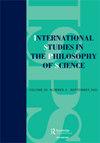Introduction
IF 0.8
2区 哲学
Q2 HISTORY & PHILOSOPHY OF SCIENCE
International Studies in the Philosophy of Science
Pub Date : 2022-10-02
DOI:10.1080/02698595.2023.2218190
引用次数: 0
Abstract
The East European Network for Philosophy of Science (EENPS) is a network of philosophers of science and researchers from related disciplines educated, affiliated, or working at the academic institutions in the broadly understood region of Eastern Europe. The 3 Conference of the EENPS that took place in Belgrade, Serbia in 2021 was a well-attended event with contributions from scholars from diverse backgrounds. Trpin’s (2021) report on the conference noted that the conference had many sections, including general philosophy of science, philosophy of medicine, philosophy of cognitive science, philosophy of biology, history of logic, philosophy of economics, philosophy of social sciences, philosophy of physics, psychology and philosophy of science and formal philosophy of science. The diversity of topics presented at the conference is also reflected in the four papers included in the Topical Collection for this year’s EENPS conference. These papers address a range of issues related to science and philosophy, including social knowledge, the nature of truth and understanding, consciousness and selfhood, and the hard problem of consciousness. Lilia Gurova’s paper, ‘The Uses of Truth: Is There Room for Reconciliation of Factivist and Non-Factivist Accounts of Scientific Understanding?’ is an important contribution to the ongoing debate on scientific understanding. The argument between those who subscribe to factivism and those who do not revolves around the relationship between understanding and truth. According to Gurova, the line between factivism and non-factivism is not as straightforward as it appears, and there is a coming together of viewpoints between the two sides. Specifically, Gurova highlights how both factivists and non-factivists utilise the concept of ‘effectiveness’ as a replacement for truth, indicating a deeper similarity between the two positions. In his paper, ‘Scientific Practices as Social Knowledge’, Juho Lindholm explores the idea that science is inherently a social practice. Lindholm outlines five distinct ways in which science is social, including the fact that language, which is fundamentally social, underpins science. Other ways in which scientific practice is socially informed are related to the fact of being shaped by the presence of other organisms in the environment; of being public and publicly shared. Furthermore, scientific knowledge can be used to effect social and ethical change and can be employed to enhance human welfare.介绍
东欧科学哲学网络(EENPS)是一个由科学哲学家和相关学科的研究人员组成的网络,他们在广泛了解的东欧地区的学术机构接受教育、附属或工作。2021年在塞尔维亚贝尔格莱德举行的EENPS第三次会议是一次出席人数众多的活动,来自不同背景的学者做出了贡献。Trpin(2021)关于会议的报告指出,会议有许多部分,包括一般科学哲学、医学哲学、认知科学哲学、生物学哲学、逻辑史、经济学哲学、社会科学哲学、物理学哲学、心理学和科学哲学以及形式科学哲学。会议主题的多样性也反映在今年EENPS会议主题集中的四篇论文中。这些论文涉及一系列与科学和哲学有关的问题,包括社会知识、真理与理解的本质、意识与自我以及意识的难题。Lilia Gurova的论文《真理的用途:科学理解中的事实主义和非事实主义观点有调和的空间吗?》是对正在进行的关于科学理解的辩论的重要贡献。赞成派系主义者和反对派系主义者之间的争论围绕着理解与真理之间的关系展开。根据古洛娃的说法,派系主义和非派系主义之间的界限并不像表面上看起来那么简单,双方的观点趋于一致。具体而言,Gurova强调了真实主义者和非真实主义者如何利用“有效性”的概念来代替真理,这表明两种立场之间有着更深的相似性。Juho Lindholm在他的论文《作为社会知识的科学实践》中探讨了科学本质上是一种社会实践的观点。Lindholm概述了科学具有社会性的五种不同方式,包括语言,从根本上讲是社会性的,是科学的基础。科学实践获得社会信息的其他方式与环境中其他生物的存在所塑造的事实有关;公开和公开分享。此外,科学知识可用于实现社会和伦理变革,并可用于提高人类福利。
本文章由计算机程序翻译,如有差异,请以英文原文为准。
求助全文
约1分钟内获得全文
求助全文
来源期刊

International Studies in the Philosophy of Science
HISTORY & PHILOSOPHY OF SCIENCE-
自引率
12.50%
发文量
10
期刊介绍:
International Studies in the Philosophy of Science is a scholarly journal dedicated to publishing original research in philosophy of science and in philosophically informed history and sociology of science. Its scope includes the foundations and methodology of the natural, social, and human sciences, philosophical implications of particular scientific theories, and broader philosophical reflection on science. The editors invite contributions not only from philosophers, historians, and sociologists of science, but also from researchers in the sciences. The journal publishes articles from a wide variety of countries and philosophical traditions.
 求助内容:
求助内容: 应助结果提醒方式:
应助结果提醒方式:


